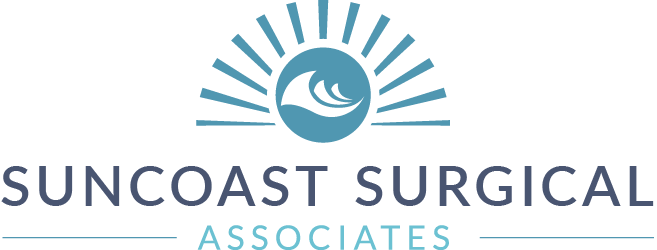Diet Guidelines After Abdominal Surgery: Foods to Eat & Avoid
After undergoing abdominal surgery, proper nutrition plays a crucial role in your recovery. The right diet can help rebuild tissue, prevent infection, and restore your strength. At Suncoast Surgical Associates, our surgical team emphasizes evidence-based nutrition as part of your healing process to ensure the best post-surgical outcomes.
Let’s explore what to eat — and what to avoid — after abdominal surgery, based on the latest clinical research.
What to Eat After Abdominal Surgery
1. High-Protein Foods for Healing
Protein supports wound healing and muscle recovery. Studies have found that most patients consume far less protein than needed during the first postoperative week, with deficiencies slowing recovery and increasing complication risks (Constansia et al., 2021), (Hardy et al., 2023).
Recommended sources:
Lean meats (chicken, turkey, fish)
Eggs and Greek yogurt
Plant proteins (beans, lentils, tofu)
Protein shakes or supplements, if approved by your surgeon
Aim for at least 1.2–1.5 grams of protein per kilogram of body weight daily, as recommended by the European Society for Clinical Nutrition and Metabolism (ESPEN).
2. Energy-Rich Foods for Strength
Caloric intake is equally vital for recovery. Post-surgical patients often consume less than half of their recommended energy needs, contributing to fatigue and muscle loss (Constansia et al., 2021).
Include:
Whole grains (oatmeal, brown rice, whole wheat pasta)
Healthy fats (avocado, olive oil, nuts)
Smoothies for easy digestion
3. Soft, Easily Digestible Foods
Early reintroduction of soft or pureed foods reduces discomfort and promotes gut recovery. Research supports early oral feeding within 24 hours after surgery, improving bowel function and reducing hospital stay without increasing complications (Charoenkwan & Matovinovic, 2014).
Try:
Mashed potatoes or sweet potatoes
Applesauce and bananas
Broth-based soups
Scrambled eggs or oatmeal
4. Micronutrient-Rich Foods
Patients often fall short on vitamins and minerals after gastrointestinal surgery, especially vitamins A, D, B12, and iron (Carey et al., 2012).
Include:
Colorful fruits and vegetables
Fortified dairy or plant-based milks
Multivitamin supplements (as advised by your healthcare provider)
Foods to Avoid After Abdominal Surgery
1. Fatty and Fried Foods
High-fat and greasy foods slow digestion and can worsen nausea, bloating, or diarrhea. A study on gallbladder surgery patients found that those consuming more animal fats and cholesterol experienced more digestive symptoms post-surgery (Shin et al., 2017).
2. Gas-Producing Foods
Avoid foods that cause bloating or abdominal discomfort, such as:
Beans, lentils, and cruciferous vegetables (broccoli, cabbage)
Carbonated drinks
Chewing gum or drinking through straws
3. Processed and Sugary Foods
Processed snacks and refined sugars can promote inflammation and delay wound healing (Wobith & Weimann, 2022).
4. Alcohol and Caffeine
Both irritate the stomach lining, interfere with medications, and can dehydrate the body. Wait until your surgeon confirms it’s safe to resume these beverages.
When to Seek Medical Guidance
If you experience persistent nausea, vomiting, diarrhea, or loss of appetite, consult your surgical team immediately. Individual dietary tolerance can vary depending on the type of abdominal surgery performed.
At Suncoast Surgical Associates, our specialists provide personalized nutrition guidance to help you recover safely and comfortably. Our integrated approach ensures your diet complements your surgical care for optimal healing.
A balanced post-surgery diet — rich in protein, calories, vitamins, and easy-to-digest foods — is key to a smooth recovery after abdominal surgery. Avoid fatty and processed foods, stay hydrated, and consult your surgical team for individualized recommendations.
For expert surgical and postoperative care, trust Suncoast Surgical Associates — where your recovery is our top priority.
Works Cited
Carey, S., Young, J. M., & Allman-Farinelli, M. (2012). Food and Nutrient Intake among People Following Major Upper Gastrointestinal Surgery. Food and Nutrition Sciences, 3(7), 1004–1008. (link)
Charoenkwan, K., & Matovinovic, E. (2014). Early versus delayed oral fluids and food for reducing complications after major abdominal gynaecologic surgery. The Cochrane Database of Systematic Reviews, 12, CD004508. (link)
Constansia, R., Hentzen, J., Hogenbirk, R. N. M., et al. (2021). Actual postoperative protein and calorie intake in patients undergoing major open abdominal cancer surgery. Nutrition in Clinical Practice, 37(1), 183–191. (link)
Hardy, E., Deane, C., Lund, J., & Phillips, B. E. (2023). Loss of muscle mass in the immediate post-operative period is associated with inadequate dietary protein and energy intake. European Journal of Clinical Nutrition, 77, 503–505. (link)
Shin, Y., Choi, D., Lee, K., Choi, H., & Park, Y. (2017). Association between dietary intake and postlaparoscopic cholecystectomic symptoms in patients with gallbladder disease. The Korean Journal of Internal Medicine, 33, 829–836. (link)
Wobith, M., & Weimann, A. (2022). Postoperative Nutrition Management: Who Needs What?Visceral Medicine, 38(6), 354–362. (link)
